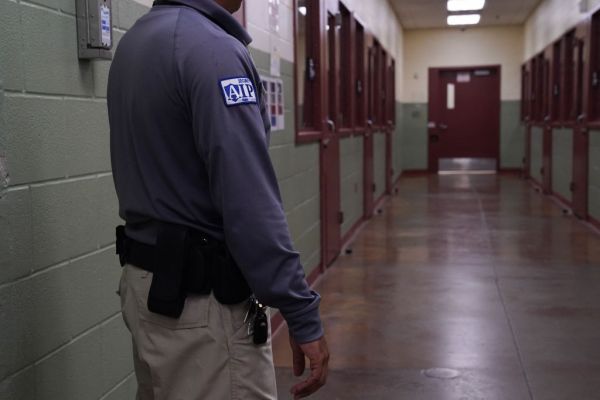Democrats must prove to voters that they care about border security and oppose illegal immigration—at least that’s one of the early conclusions party insiders are drawing as they scrutinize Vice President Kamala Harris’ failed White House bid.
“Our party did make a pretty fundamental shift on the issue of migration through our support of the bipartisan border security bill. It was probably too late after years of—of creating an impression that we weren’t as serious as Republicans about border security,” Sen. Chris Murphy of Connecticut, a key Democratic negotiator of that ultimately failed legislation, told The Dispatch on Wednesday. “We are doomed to be a minority party if we don’t make it clear that while we want comprehensive immigration reform, we see an orderly border as the priority.”
Doing so will require concrete action, said Rep. Jared Golden, a Maine Democrat who previously introduced legislation to codify “Remain in Mexico,” a favorite Trump policy that requires asylum-seekers to stay south of the border while their claims are being adjudicated instead of waiting out proceedings from within the U.S. It’s this sort of approach that has enabled Golden to win reelection three times in a district that has supported Trump over the Democratic presidential nominee by an average of 8.9 percentage points in three presidential elections.
But just as important, explained Golden, is talking to voters about border security and illegal immigration without accusing them of latent racism or xenophobia, and with empathy. “I’m not afraid as a Democrat … to say: ‘You can’t have a nation without borders, can’t have a meaningful nation without the concept of citizenship, and what that entails both in terms of rights and responsibilities.’”
“I don’t agree with people who say that immigration doesn’t come at a cost to the working class,” Golden added, to The Dispatch. “I hear so many people say: ‘Oh, well they’re just doing the jobs that American workers don’t want to do.’ Really? They don’t want to work in the construction industry? Interesting. I guess Americans don’t value working with their hands, building things and making things. That’s definitely been an issue.”
The distinct but connected issues of border security and illegal immigration were not the lone contributors to Harris’ November 5 loss to President-elect Donald Trump. But with the baggage associated with President Joe Biden no longer a factor going forward, they possibly represent the most stubborn electoral challenge Democrats will have to address.
To be sure, Trump could overreach in his bid to get both under control, particularly with challenges his administration may have in carrying out “mass deportations.” But in conversations with nearly a dozen veteran Democratic operatives and lawmakers in Washington and the swing states that decide the race for the White House, the consensus was that the party has to be proactive in reorienting both its messaging and legislative approach to border security and illegal immigration.
“Clearly we Democrats weren’t on the right side of the issue,” said Democratic strategist Dane Strother, who splits his time between Washington, D.C., and California. And it’s not just that the Democrats were on the “wrong side” of immigration and border security, Strother said. It’s that they gave voters the impression that they were more concerned with inconsequential issues. “We went from what bathroom you should use, to what pronoun you should use, to who can play what sports,” Strother said. “America said: ‘What about us?’”
Mike Veon, a Democratic operative in Pittsburgh and former party leader in the state House of Representatives, emphasized that his party has long pursued what it believed was the “correct” and “humane” policies for dealing with border security and people who cross the Mexican border illegally. However, in doing so, Democrats ignored what a majority of American voters wanted from their elected officials, Veon said.
“Democrats missed it for years and we paid a steep price for it in the 2024 election,” he explained. “There should have been a bright red light going off.”
Consider Pennsylvania. The Keystone State was perhaps the 2024 contest’s most important battleground state. Trump won all but nine of the commonwealth’s 67 counties on his way to a 50.4 percent to 48.7 percent victory over Harris. It’s the first time in three tries that Trump cracked 49 percent, let alone 50.
Democrats have lost elections before, including in 2016 to Trump who ran on securing the border and choking off illegal border crossings then too. Yet neither that defeat nor previous losses prompted introspection about the party’s rhetorical strategy and substantive agenda for handling these politically charged issues.
So, why so much Democratic angst now?
Because the perception that Democrats don’t care about securing the border can no longer be explained away as merely a white working class phenomenon. In 2024, that perception hurt Democrats with working class Hispanic voters too, despite Trump’s vow to deport illegal immigrants on a mass scale.
In 2016, Hispanic men and women delivered 65 percent and 67 percent of their votes to Democratic nominee Hillary Clinton, respectively. Trump earned 28 percent of the vote from each cohort, according to the Pew Research Center. Four years later, Trump improved his numbers with Hispanic men and women to 40 percent and 37 percent, respectively, according to Pew. The 45th president even won Zapata County, a majority Hispanic Texas border county that had not voted Republican for president in nearly a century and that, four years earlier, delivered 65.7 percent of its vote to Clinton.
Last month, Trump did even better, winning 48 percent of Hispanic men, to Harris’ 49 percent, and 39 percent of Hispanic women, to the vice president’s 59 percent, according to the Associated Press. And along the Texas border, Trump added more historic Democratic counties to his win column, capturing 14 of 18 counties in the majority Hispanic region, “doubling his 2020 performance,” The Texas Tribune reported. Statistics like these are among the reasons Harris ran into trouble in the Southwest battlegrounds of Arizona and Nevada, where performing strongly with Hispanics is crucial to the Democrats’ prospects for success.
In Arizona, Trump won 44 percent of Hispanic men and 43 percent of Hispanic women, per exit polls. In exit polls in Nevada, the president-elect posted even more robust results with Hispanic men, winning 60 percent of them, while holding his own with Hispanic women, 39 percent. These numbers represented substantial improvements for Trump, over both 2016 and 2020. Mike Madrid, a Republican strategist who supported Harris and specializes in Hispanic voters said this shift toward the Republicans has been underway for quite some time.
“In 2021, Latino voters started to become more for border security and less for the immigration reform piece,” he said. “Democrats lost the battle because Latino voters shifted underneath them.” Hispanic voters, who Madrid argues are more populist than they are philosophically liberal or conservative, are telling Democrats through their 2024 choices that they want both border security and immigration reform “but don’t need them at same time.”
Indeed, Democratic strategists who monitor Hispanic voting habits and were working to elect Harris saw this drift to Trump happening in real time, although for the party writ large it was a shock.
“The border is a law and order consideration,” Carlos Odio, one such strategist, told Madrid on a recent episode of his podcast, aptly named The Latino Vote. “The impression that was baked at that point and then carried through to focus groups that we were hearing at the very end is that Biden just left the door open and doesn’t care what happens. This was not like anti-immigrant sentiment among Latinos. This was saying: This is just not an orderly way to deal with this.”
Sensing that immigration was becoming a greater political liability, Biden months before the election used executive authority to strengthen border security and stop illegal border crossers from gaming the asylum system—moves that reversed action he took early in his administration to undo the security measures put in place by Trump. But by then it was too late to reverse perceptions.
While Republicans are not always unified on border security and illegal immigration, the GOP position generally (especially since Trump’s ascendancy) has been to oppose amnesty for illegal immigrants and demand border security up front.
The Democratic positions broadly have been to pursue “comprehensive immigration reform” that prioritizes the immediate legal status for illegal immigrants, usually including a pathway to citizenship, in exchange for border security measures that take time to implement. Harris, steeped in the politics in her home state of California, had even voiced support for reducing funding and paring back Immigration and Customs Enforcement, the federal agency tasked with securing the border.
But seeing the same voter dissatisfaction Biden did before dropping out of the presidential race, Harris attempted to flip the script—both on the progressive immigration policies she supported during her 2020 White House bid and on Trump. The vice president attacked the Republican nominee for opposing the bipartisan border security package that failed in the Senate this year and traveled to Arizona to visit the border. There, she promoted her history as a former prosecutor, saying she would prioritize securing the border, tighten up the asylum system, and deport criminal illegal immigrants. Harris also said she would support a path to citizenship for some here illegally.
Post-election polling by the Democratic firm Navigators found that the issues of “immigration and the border” were among the biggest motivators when deciding whom to vote against for critical blocs, including “swing voters” (33 percent); “new Trump voters” (50 percent); and Democrats who backed Trump (46 percent.) In other words, concerns voters had about Harris on these issues played a major role in pushing voters to Trump.
So, if Harris eventually landed on the right message, why didn’t more voters buy what she was selling?
Democratic operatives who worked on the Harris campaign believe the vice president simply did not have enough time—her bid lasted slightly more than 100 days—to change voters’ perceptions of what she, as the leading Democrat, stood for on border security and illegal immigration, after years of the party defining itself as the opposite of her “tougher” message. Nor could she overcome voters’ perceptions after Biden loosened border restrictions early in his tenure, which created a sense of chaos at the border and in urban areas across the country where migrants settled.
“People believed she was a San Francisco liberal who wants to open the border,” said a Democratic strategist who worked on the Harris campaign and requested anonymity to speak candidly. To the extent that the vice president landed on the right policy (and this former Harris campaign aide believes she did) the other piece of the puzzle is running candidates who are credible border hawks. (With more time as the nominee, Harris might have become such a candidate, the former aide said.)
“I don’t think it’s a policy thing; I don’t think it’s a messaging thing. I think it’s about our messengers.” This Democratic insider added: “The message was there, policy was there, but we were never going to out-scapegoat Donald Trump on immigrants.”
Looking ahead to 2026, and 2028, Democrats, theoretically, have time to convince voters that they care about border security, oppose illegal immigration, and will take action to back up those claims. That begins, say Democrats who focus on immigration policy, with actually having an immigration policy that emphasizes support for border security and opposition to illegal crossings, versus criticizing Trump and his provocative rhetoric or waiting for the incoming president to overreach.
That means being proactive, even if the Republicans shut down Democratic proposals.
“We should put the [bipartisan border security] bill back on the floor and talk about it constantly,” said Matt Bennett, a spokesman for Third Way, a centrist Democratic think tank in Washington. Trump, he added, “spent the last four years telling people who he is … So, losing to him and his forces down ballot, at scale, requires that we do something differently.”
Charles Hilu contributed to this report.







Please note that we at The Dispatch hold ourselves, our work, and our commenters to a higher standard than other places on the internet. We welcome comments that foster genuine debate or discussion—including comments critical of us or our work—but responses that include ad hominem attacks on fellow Dispatch members or are intended to stoke fear and anger may be moderated.
With your membership, you only have the ability to comment on The Morning Dispatch articles. Consider upgrading to join the conversation everywhere.